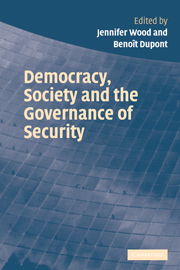Book contents
- Frontmatter
- Contents
- List of contributors
- Foreword
- Acknowledgements
- Introduction: Understanding the governance of security
- 1 Reflections on the refusal to acknowledge private governments
- 2 Transnational security governance
- 3 Two case studies of American anti-terrorism
- 4 Power struggles in the field of security: implications for democratic transformation
- 5 Policing and security as ‘club goods’: the new enclosures?
- 6 The state, the people and democratic policing: the case of South Africa
- 7 Necessary virtues: the legitimate place of the state in the production of security
- 8 From security to health
- 9 Research and innovation in the field of security: a nodal governance view
- Conclusion: The future of democracy
- References
- Index
7 - Necessary virtues: the legitimate place of the state in the production of security
Published online by Cambridge University Press: 22 September 2009
- Frontmatter
- Contents
- List of contributors
- Foreword
- Acknowledgements
- Introduction: Understanding the governance of security
- 1 Reflections on the refusal to acknowledge private governments
- 2 Transnational security governance
- 3 Two case studies of American anti-terrorism
- 4 Power struggles in the field of security: implications for democratic transformation
- 5 Policing and security as ‘club goods’: the new enclosures?
- 6 The state, the people and democratic policing: the case of South Africa
- 7 Necessary virtues: the legitimate place of the state in the production of security
- 8 From security to health
- 9 Research and innovation in the field of security: a nodal governance view
- Conclusion: The future of democracy
- References
- Index
Summary
Thus far … we have no reason to suppose that there is any better general solution to the problem of security, and little, if any, reason to regard any other possible countervailing value as a serious rival to security as the dominant continuing human need.
(Dunn 2000: 212)In their recent book Governing Security, Johnston and Shearing pinpoint what they see as a significant shift in criminological writing about ‘the problem of the state’ (2003: 33–4). Three decades ago, they contend, ‘cutting-edge criminological theory’ posited the state as the ‘problem’ – structurally tied to class interests, systemically and unjustly directed towards coercing the poor and weak, incapable of defending public interests against narrowly drawn private ones. It was, as such, a force to be struggled against and, ultimately, transcended. Today, by contrast, such theory has come to invest in the state as ‘solution’ – a means of articulating and defending the ‘public interest’ in a market society whose neo-liberal champions triumphantly proclaim that no such thing exists. Johnston and Shearing describe this situation as a ‘strange paradox’ (2003: 34).
But perhaps this is not so very paradoxical. In an age of ‘solid modernity’ (Bauman 2000) it could indeed be claimed that the task of defending dispossessed individuals and groups from the overweening and intrusive reach of the coercive, bureaucratic state pressed itself with particular urgency upon the forces of progressive politics, whether liberal or socialist. But we no longer inhabit such a world.
- Type
- Chapter
- Information
- Democracy, Society and the Governance of Security , pp. 165 - 195Publisher: Cambridge University PressPrint publication year: 2006
- 76
- Cited by

